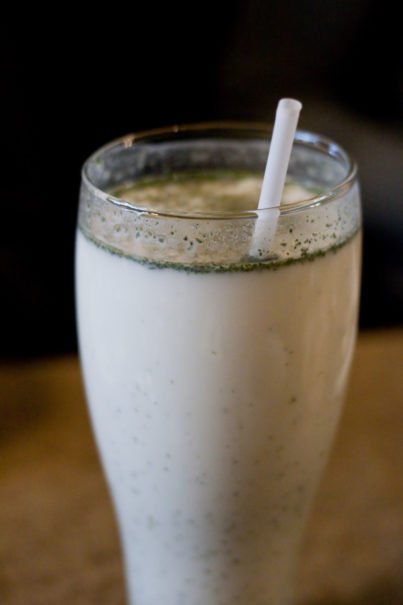
A Dispatch From Iran in the Age of Trump

A Dispatch From Iran in the Age of Trump
Doogh in Tehran
On Valiasr Avenue, the great spine of Tehran that runs north to south from the foothills to the plains, there is a place called the Lorca Café. Its patrons drink French press coffee under pictures of the Spanish poet, and the floating shelves hold translations of his plays.
Today Leonard Cohen is singing I’m Your Man on the speakers, and I’m drinking doogh, a salty yoghurt drink popular in Iran since the time of ancient Persia. It typically accompanies the country’s famous lamb kebabs, and can be garnished with cucumbers or mint.
I come to the Lorca every afternoon to study my Persian lessons, and spend a few hours dedicated to the sound of my father’s language. So many words strike me as at once simplistically literal and naturally poetic. One translation of the verb ‘to weep’ is to spill tears. ‘To pray’ is to want from God. And in fact, the word for God (khoda) is almost the same as the one for the self (khod), hinting at the streak of mysticism that animates the Iranian heart.
But I’m distracted and I can’t study. The previous day, Trump’s now-disgraced national security advisor Michael Flynn had held a press conference officially putting Iran ‘on notice.’ I had no idea what that meant, but it had stirred the old specter of war, dormant since the nuclear deal in 2015, and suddenly the city seemed at once prouder and more fragile, and its peace more precious.
I have come to love Tehran for its energy and resilience, but it is no easy place to be. The air is almost permanently soured by smog and smoke, which often masks the Alborz mountains only a few miles to the north. There are dozens of half-finished towers across town, bronzed over with rusting steel. During the years of devastating sanctions, construction was one of the only self-contained industries, and they built things for the sake of it—to give the workers something to do, to keep the cement factories open. These buildings are unlikely to ever be completed. Most days I can’t see anyone working on the sites, then I glimpse some solitary worker shoveling dust from corner to corner.
Yet I’ve been happy here. When it snows, the flakes settle like grains of salt on the veils of passing matriarchs, and spires of roasted beetroot fill the doorways of the grocers. Outside Lorca’s there is a street musician playing an electric violin fashioned out of a broomstick, and beside him a man sells pastries from the trunk of his car, and if you say the word he procures new-born puppies from a cardboard box and urges you to take one home.
It hurts even to imagine the country at war. All of this cowering, or gone.
I abandon my revision, finish my doogh, and slip outside to buy some phone credit. The kiosk is manned by a 10-year-old boy reading a book on the big cats of Africa. He hears my accent and asks where I’m from.
‘England.’
‘Where’s England exactly?’
‘It’s part of a big island in Western Europe.’
‘Do they have lions in England?’
‘No.’
‘Hmm, too bad.’ And with that he lost interest in me and my faraway country.